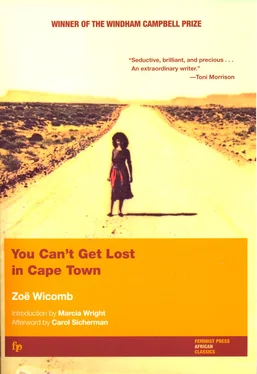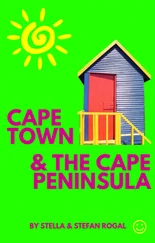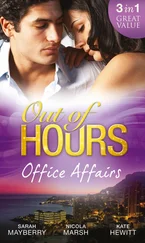‘Down there the earth is baking at ninety degrees. You won’t find anywhere cooler than here in the mountains.’
We drive in silence along the last of the incline until we reach what must be the top of the Gifberge. The road is flanked by cultivated fields and a column of smoke betrays a hidden farmhouse.
‘So they grow things on the mountain?’
‘Hmm,’ she says pensively, ‘someone once told me it was fertile up here, but I had no idea of the farm!’
The bleached mealie stalks have been stripped of their cobs and in spite of the rows lean arthritically in the various directions that pickers have elbowed them. On the other side a crop of pumpkins lies scattered like stones, the foliage long since shrivelled to dust. But the fields stop abruptly where the veld resumes. Here the bushes are shorter and less green than in the pass. The road carries on for two miles until we reach a fence. The gate before us is extravagantly barred; I count thirteen padlocks.
‘What a pity,’ she says in a restrained voice, ‘that we can’t get to the edge. We should be able to look down on to the plain, at the strip of irrigated vines along the canal, and the white dorp and even our houses on the hill.’
I do not mind. It is mid-afternoon and the sun is fierce and I am not allowed to complain about the heat. But her face crumples. For her the trip is spoiled. Here, yards from the very edge, the place of her imagination has still not materialised. Nothing will do but the complete reversal of the image of herself in the wicker chair staring into the unattainable blue of the mountain. And now, for one brief moment, to look down from these very heights at the cars crawling along the dust roads, at the diminished people, at where her chair sits empty on the arid plain of Klein Namaqualand.
Oh, she ought to have known, at her age ought not to expect the unattainable ever to be anything other than itself. Her disappointment is unnerving. Like a tigress she paces along the cleared length of fence. She cannot believe its power when the bushes disregard it with such ease. Oblivious roots trespass with impunity and push up their stems on the other side. Branches weave decoratively through the diamond mesh of the wire.
‘Why are you so impatient?’ she complains. ‘Let’s have an apple then you won’t feel you’re wasting your time. You’re on holiday, remember.’
I am ashamed of my irritation. In England I have learnt to cringe at the thought of wandering about, hanging about idly. Loitering even on this side of the fence makes me feel like a trespasser. If someone were to question my right to be here. I shudder.
She examines the padlocks in turn, as if there were a possibility of picking the locks.
‘You could climb over, easy,’ she says.
‘But I’ve no desire to.’
‘Really? You don’t?’ She is genuinely surprised that our wishes do not coincide.
‘I think I saw an old hut on our way up,’ she says as we drive back through the valley. We go slow until she points, there, there, and we stop. It is further from the road than it seems and her steps are so slow that I take her arm. Her fluttering breath alarms me.
It is probably an abandoned shepherd’s hut. The reed roof, now reclaimed by birds, has parted in place to let in shafts of light. On the outside the raw brick has been nibbled at by wind and rain so that the pattern of rectangles is no longer discernible. But the building does provide shelter from the sun. Inside, a bush flourishes in the earth floor.
‘Is it ghanna?’ I ask.
‘No, but it’s related, I think. Look, the branches are a paler grey, almost feathery. It’s Hotnos-kooigoed.’
‘You mean Khoi-Khoi-kooigoed.’
‘Really, is that the educated name for them? It sounds right doesn’t it?’ And she repeats Khoi-Khoi-kooigoed, relishing the alliteration.
‘No, it’s just what they called themselves.’
‘Let’s try it,’ she says, and stumbles out to where the bushes grow in abundance. They lift easily out of the ground and she packs the uprooted bushes with the one indoors to form a cushion. She lies down carefully and mutters about the heat, the fence, the long long day, and I watch her slipping off to sleep. On the shaded side of the hut I pack a few of the bushes together and sink my head into the softness. The heat has drawn out the thymish balm that settles soothingly about my head. I drift into a drugged sleep.
Later I am woken by the sun creeping round on to my legs. Mamma starts out of her sleep when I enter the hut with the remaining coffee.
‘You must take up a little white protea bush for my garden,’ she says as we walk back to the bakkie.
‘If you must,’ I retort. ‘And then you can hoist the South African flag and sing “Die Stem.’”
‘Don’t be silly; it’s not the same thing at all. You who’re so clever ought to know that proteas belong to the veld. Only fools and cowards would hand them over to the Boers. Those who put their stamp on things may see in it their own histories and hopes. But a bush is a bush; it doesn’t become what people think they inject into it. We know who lived in these mountains when the Europeans were still shivering in their own country. What they think of the veld and its flowers is of no interest to me.’
As we drive back we watch an orange sun plummet behind the hills. Mamma’s limp is pronounced as she gets out of the bakkie and hobbles in to put on the kettle. We are hungry. We had not expected to be out all day. The journey has tired her more than she will admit.
I watch the stars in an ink-blue sky. The Milky Way is a smudged white on the dark canvas; the Three Kings flicker, but the Southern Cross drills her four points into the night. I find the long axis and extend it two and a half times, then drop a perpendicular, down on to the tip of the Gifberge, down on to the lights of the Soeterus Winery. Due South.
When I take Mamma a cup of cocoa, I say, ‘I wouldn’t be surprised if I came back to live in Cape Town again.’
‘Is it?’ Her eyes nevertheless glow with interest.
‘Oh, you won’t approve of me here either. Wasted education, playing with dynamite and all that.’
‘Ag man, I’m too old to worry about you. But with something to do here at home perhaps you won’t need to make up those terrible stories hey?’
assegai
spear
bakkie
small truck
bobotie
spiced dish of meat and fruit
Boerjongens
country bumpkins
Boeta
addressed respectfully to a brother
boskop
frizzy head of hair
braaivleis
barbecue
brakhond
mongrel dog
bredie
stew
canna
flowering plant
crimplene
inexpensive synthetic fabric
dagga pils
marijuana joint
Dankie Meneer
Thank you, sir
‘Die Stem’
Afrikaner national anthem
doekie
headscarf
dominee
minister of the Dutch Reformed Church
donga
ravine
dorp
small town
D.V.
Deo volente (Latin), God willing (common pious expression)
Ewe
greeting (Hello)
geelbos
type of bush
gelyk
simultaneously
gemake
made (Afrikaans prefix ge- forming the past tense)
goggas
insects
gorra
well
grenadilla
passion fruit
Hotnos
abbreviation of Hottentots
Hottentots
derogatory name for the Khoi-Khoi Cape aboriginals
Jantjie Bêrend
medicinal herb
kak
shit
kambroo
wild root vegetable
karos
blanket or shawl of animal skin
Khoi-Khoi
Cape aboriginals
klawerjas
card game
kloof
ravine
koeksisters
doughnuts
Читать дальше












